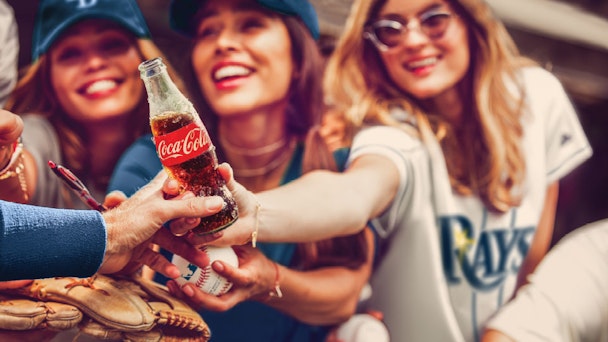Aaron Kwittken: I'd like to save the world with a Coke
Coca-Cola recently unveiled a new campaign, that’s actually a re-skinned, re-booted old campaign, to help ‘cement’ its self-proclaimed purpose as a brand with the power to unite people. Put simply it’s as an evolution of "Unite and Uplift".

Aaron Kwittken: I'd like to save the world with a Coke
Walter Susini, senior vice-president of marketing EMEA at Coca-Cola, said to The Drum: “Our brand is about bringing people together. We’ve been doing it for 134 years, it’s not a new, genius idea but we’re going to focus on what we do best, which is unite and uplift… we want to be a bridge that brings people together.”
So, is this how Coca-Cola plans to stay relevant? Really? Is unity really the company’s new tonic they want us all to guzzle? I have a better idea. In my not so humble opinion, the best way for Coca-Cola to stay relevant - would be to actually be relevant - by leaning more into the healthier side of its business – sparkling water, tea, coffee and milk. Ditch the sugar and syrup businesses and invest more in battling obesity and diabetes.
Back to the campaign. It launched this week and will run in Europe under the tagline “Everything is better when we’re open” and aims to help address the divisions between people and close what Susini calls a clear “empathy gap.” The first video asks viewers the question ‘Can I Be Wrong?’ and is designed to suggest that if society changed for the better, claimed responsibility for their actions, we’d live in a better place. Sigh.
To be fair, there is some consistency to the brand. In the past, it has taken a vow “never to shy away from social issues”, which has included issues on LGBTQ+ rights. It is a tough line to walk and a topical area to get consumer attention, but as a brand, unlike Pepsi’s Kendall Jenner misfire, Coke actually has more permission to re-tread the purpose territory.
In 2017, ahead of Australia’s same-sex marriage vote, the brand added rainbow lights to its Sydney billboard and launched 'Love' Coke cans in support of marriage equality. That same year it famously used a drink for a prop in the pool boy video that gave a nod to LGBTQ+ inclusivity and diversity. The issue of sustainability is also one that the brand continues to circle around, pledging to use a minimum of 50% recycled material in their packaging and recycle as many plastic bottles as it uses by 2030.
It was in 2019 Coke realised the error of their ways by re-instating the CMO role they publicly killed in 2017, with the appointment of Manolo Arroyo. Maybe this campaign carries the mark of Manolo’s influence?
But is trying to communicate empathy through creative enough when it comes to corporate character building? Can’t consumers see through the fog of brand goodness? It's not just Coke. Companies like P&G have been accused of “virtue signalling” when they use creative campaigns to convey brand purpose (and boost sales). From Always’ “like a girl” campaign to Gillette’s “toxic masculinity” campaign and, most recently, the “don’t sweat” campaign for Secret.
Whereas Unilever’s chief executive Alan Jope was all business when he announced the company’s plan to "dispose" of any brands that lack social purpose. Personally, I like Unilever’s approach better. It’s real in both intent and action. Jope’s approach may also reduce the need to build purpose-driven creative assets because they are now built into the business, and therefore already core to the brand.
Coke’s latest campaign doesn’t entirely leave a bad taste in my mouth. The timing seems to align nicely with Brexit despite Susini’s comment that Coca-Cola “shouldn’t take a stand on political issues, we should – and are – taking a stand on social issues. When we see divisions, discriminations, inequality, that’s where we want to talk. Coca-Cola doesn’t need to talk [about] Trump, or Brexit; these are not our issues.”
Let’s face it, while Coke says it plans to include KPIs around how they’re driving conversations around empathy, sales are still going to be the bottom-line number that will be watched internally.
In some respects, this could be the ‘purpose campaign of 2020’. Not that I want to call it yet, it does raise some valid points: it’s creating a brand experience, it supports a good cause and it’s got me fuming, err, writing about it.
What I’d like to see Susini discuss is how Coca-Cola will develop tangible actions by way of programmes and donations towards causes that support the theme. Otherwise, there is a real risk of it being another social good campaign masquerading in a thinly veiled copy of commercial purpose.
As creatives, we need to ask ourselves whether this lean into purpose is becoming a #PurposeMeToo for the industry?
Because at the moment, it feels that more often than not, brands are doing more talking rather than using their business as a power for good. Tackling global issues in campaigns seems to be the flavor of the moment, yet after a closer inspection more often than not, they don’t tend to follow through on their promise or have a meaningful impact.
Instead, how about brands start taking action first and then develop campaigns that demonstrate a real-world impact on the lives of whom we’re talking to and caring about?
I’d like to save the world with a coke. But right now that doesn’t seem like a possibility.
Aaron Kwittken is founder and CEO of brand and PR agency KWT Global and creator/host of the popular Brand on Purpose podcast

